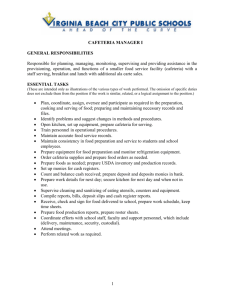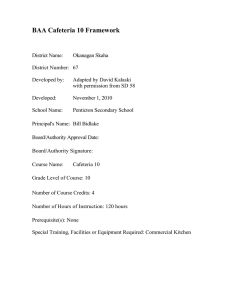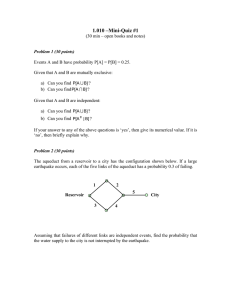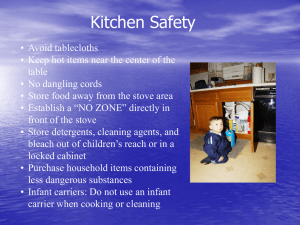BAA Cafeteria 10 Framework
advertisement
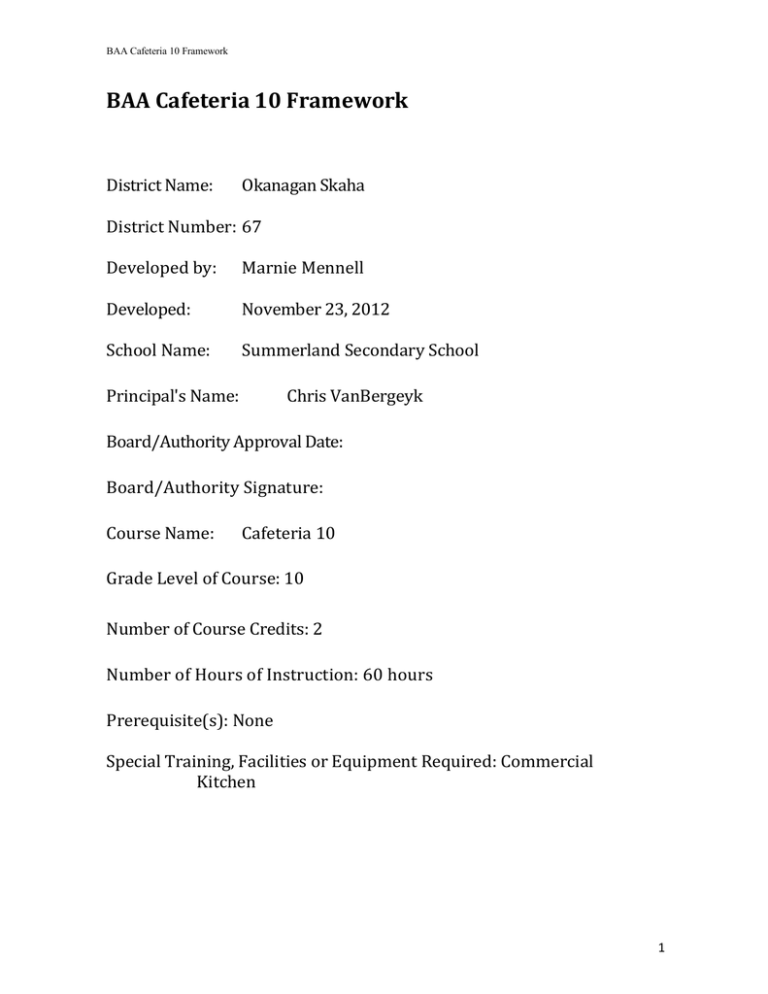
BAA Cafeteria 10 Framework BAA Cafeteria 10 Framework District Name: Okanagan Skaha District Number: 67 Developed by: Marnie Mennell Developed: November 23, 2012 School Name: Summerland Secondary School Principal's Name: Chris VanBergeyk Board/Authority Approval Date: Board/Authority Signature: Course Name: Cafeteria 10 Grade Level of Course: 10 Number of Course Credits: 2 Number of Hours of Instruction: 60 hours Prerequisite(s): None Special Training, Facilities or Equipment Required: Commercial Kitchen 1 BAA Cafeteria 10 Framework Course Synopsis: Cafeteria 10 will introduce students to quantity food preparation and service. Student will develop the skills necessary for commercial food preparation through participation in activities related to receiving, storing, and presenting nutritious foods. Student will have opportunities to develop attitudes required by foodservice professionals and to practice customer service. Rationale Cafeteria 10 is the beginning level of a course designed to help students in quantity food preparation and service. Students will develop the skills needed in commercial food preparation. They will be involved in all aspects of food preparation from the storing of the food to the preparing of the food to the actual serving of the prepared foods. Students will be handling commercial and domestic equipment in a safe and confident manner while learning how to serve the public. Students will acquire food safety information while in training and will use this information throughout the course. Organizational Structure Unit/Topic Unit 1 Unit 2 Unit 3 Unit 4 Unit 5 Title Food Safety and Sanitation Baking Cold Food Kitchen Hot Food Kitchen Serving of Food Total Hours Time 5 hrs 20 hrs 10 hrs 10 hrs 15 hrs 60 hrs 2 BAA Cafeteria 10 Framework Unit 1: Food Safety and Sanitation Time: 5 hours + Overview: Students will consider safety and the prevention of food-borne illnesses as they handle equipment and food supplies, and use appropriate cooking and storage methods. They learn to evaluate and follow recipes using a variety of food preparation techniques and equipment as well as demonstrate organization, time management skills, and co-operation in partner and group work. They examine and apply a variety of ingredients and cooking methods to affect nutrition, flavor, texture, taste, and quality of a product. Curriculum Organizer – Cafeteria Procedures It is expected that students will: Curriculum Organizer – Theoretical It is expected that students will: demonstrate proper food handling techniques throughout the course identify and evaluate areas of concern in preparation and storage of food develop an awareness for the need of constant attention to safety and hygiene within public food-service operations understand the relationship between personal hygiene and safe food handling Learn and understand how to safely use commercial kitchen equipment Be able to relate their food safety training to the hot-holding of foods Curriculum Organizer – Practical It is expected that students will: Use their acquired knowledge to maintain a safe environment for themselves, their workers, and their customers Use kitchen tools and equipment in a safe manner understand the importance of co-operating with others apply their knowledge of food and equipment handling to themselves and to public health goals maintain an orderly and safe environment when preparing, cooking and serving food 3 BAA Cafeteria 10 Framework Unit 2: Baking Time Time: 20 hours Overview: Students will gain an understanding of the principles of quality baking. They will practice baking cookies, squares, cakes, loaves/breads, and muffin that will meet acceptable standards. Curriculum Organizer – Theoretical It is expected that students will: Know the proper criteria for the finished product Know the correct terminology involved in the making of the product understand the importance planning a recipe and how this planning relates to the preparation and presentation of their products demonstrate an ability to read and comprehend more complex recipes demonstrate a willingness to seek out alternative cooking methods and ingredients to improve the nutritional quality of a recipe Curriculum Organizer – Practical It is expected that students will: Know how to assemble the ingredients in the proper manner Know how to use the equipment safely and correctly Know how to bake the product demonstrate effective use of time demonstrate techniques required in the preparation of cookies, pastry and pies, yeast breads, Puff pastry and cakes be able to use a variety of baking methods to prepare nutritious dishes and meals while incorporating the presentation aspect 4 BAA Cafeteria 10 Framework Unit 3: Cold Food Kitchen Time: 10 hours Overview: Students will be handling ready to eat foods in an acceptable way using their food safety knowledge. They will prepare an array of cold foods as well as work with the commercial deli meat slicer, food processor and an all-fruit smoothie drink machine. Curriculum Organizer – Theoretical It is expected that students will: know how to prepare ready-to-eat foods for the public Identify how to maintain equipment according to public health goals demonstrate an understanding of the cooking principles related to each product Curriculum Organizer – Practical It is expected that students will: Handle ready-to-eat foods in preparation for salads, and sandwiches. Know how to maintain sanitary equipment while preparing a variety of foods demonstrate effective use of time be able to use a variety of cutting techniques and other food preparation techniques to prepare simple, ready-to-eat foods 5 BAA Cafeteria 10 Framework Unit 4: Hot Food Kitchen Time: 10 hours Overview: Students will work in the kitchen using commercial equipment in a safe and confident manner. They will prepare the daily Hot Special as well as work on the grill and or griddle, commercial convection, and hot-holding tray. The students will show their ability to work on this equipment in a safe and responsible manner. Curriculum Organizer — Theoretical It is expected that students will: demonstrate an understanding of the cooking principles related to each product explain and use appropriate food related terminology Curriculum Organizer — Practical It is expected that students will: Use the grill/griddle, broiler, convection oven, hot-holding station and stove-top in a safe manner Serve the public hot foods correctly Store hot foods at the appropriate hot-holding temperature demonstrate effective use of time maintain an orderly and safe kitchen while preparing and cooking hot food be able to use a variety of cooking methods to prepare nutritious dishes and meals while incorporating the presentation aspect 6 BAA Cafeteria 10 Framework Unit 5: Serving Food Time: 15 hours Overview: Students will gain valuable work experience serving the student body at lunch and at break. They will take orders from customers, work the cash register, and make up any special orders that come in. Curriculum Organizer — Theoretical It is expected that students will: Study what is an appropriate manner when working with the public Know the price list for the items on sale Learn to take orders and prepare them Understand how the cash register works Curriculum Organizer — Practical It is expected that students will: Use an appropriate manner when working with the public Be able to tell the public the price of foods Take orders and prepare them Use the cash register, give out correct change, and count out a deposit and float for next day demonstrate effective use of time apply principles of portion and quality control display a willingness to work with others co-operatively 7 BAA Cafeteria 10 Framework Learning Outcomes: It is expected that students will: Apply the knowledge they will have gained through the food safety training Handle equipment in a safe and responsible manner. Learn the importance of personal hygiene and a clean working environment. Learn correct cooking terms and be able to apply this knowledge to the products they will be making. Learn quantity food preparation and how to feed special dietary needs. Learn to prepare food in a limited time period. Learn to make foods that are attractive and nutritious. Be able to serve the public in an appropriate manner. Operate a cash register, correctly give change, and take orders from the customers. Instructional Component: direct instruction demonstration group work practical kitchen work videotape/DVD’s, internet videos modeling brainstorming independent instruction analysis of own and classmates finished products In the daily operation of the Cafeteria the class is assigned different foods to make. Students are then given the recipe to read over and we discuss the procedures. When the student is confident that they understand the recipe they will begin preparing the product. Upon completion the product is marked and if it is not of a high enough standard a one-on-one discussion is used with the student trying to analyze where he/she went wrong. Also the student is encouraged to come up with solutions to problems they may have had in the recipe. The student is required to work in the Cafeteria during class time and at both Nutrition break and Lunch break. During this time students are expected to handle the preparation of the daily food specials, the preparing of the sandwiches, and the other daily foods that are sold. The student will have actual work experience serving the public at these times. The students are marked daily on their work ethic. They are asked to do a selfevaluation of their daily assignment, and are marked on the finished product. When the students work in the Cafeteria they are marked on how hard they work on the various tasks that are required in the running of a Cafeteria Kitchen. 8 BAA Cafeteria 10 Framework Assessment Component: 60% of the grade will be based on practical work which will be teacher, peer and self assessed. This will reflect the practical nature of this course. 40 % of the grade will be based on work place skills assessment. Daily effort, initiative and work ethic students use in the actual preparing of the food for daily service. Learning Resources Textbook: Professional Cooking; Third Edition FoodTrack Program Multimedia: On Cooking Video: Food Safety The Light Gourmet Series Flour, Bread, and Baking Cooks Training videoes 9
